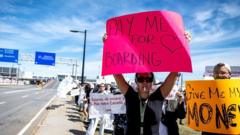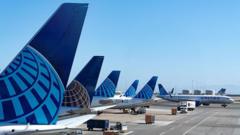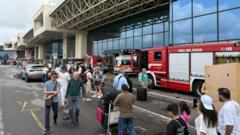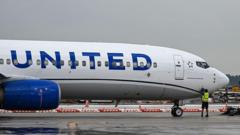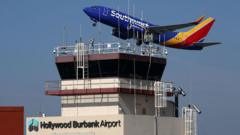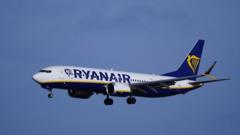Air Canada has announced the suspension of all flights amid a strike initiated by cabin crew. This industrial action, confirmed by the union representing over 10,000 flight attendants, commenced early Saturday morning, heavily impacting travel plans for approximately 130,000 passengers daily. The airline, which includes operations from its budget branch Air Canada Rouge, advised customers to avoid airport visits unless traveling with alternative airlines.
The strike became effective at 00:58 ET (04:58 GMT) on Saturday, although the airline had already begun reducing its operations prior to this deadline. According to Air Canada, the daily disruption could affect around 500 flights. Flight attendants are set to demonstrate at major Canadian airports as passengers attempt to rebook their flights, given that the airline has recommended they stay away from the airport unless they are on flights not affected by the strike.
Air Canada expressed their regrets over the inconvenience caused to customers: "Air Canada deeply regrets the effect the strike is having on customers." In preparation for the ongoing strikes, the airline reportedly canceled 623 flights affecting over 100,000 passengers late Friday evening, as it wound down operations.
In their contract negotiations, Air Canada proposed a total compensation increase of 38% over four years, including a 25% raise in the initial year. However, the union, CUPE, countered that this offer did not meet inflation, market standards, or even minimum wage requirements, leaving some work hours unpaid, especially during boarding and waiting times at airports.
The exchange of criticism between the airline and the union has intensified as negotiations falter. Earlier this month, a staggering 99.7% of union members voted in favor of the strike. The Canadian jobs minister, Patty Hajdu, appealed to both parties to resume discussions to prevent a strike and noted Air Canada’s request for governmental mediation.
CUPE maintains that it has been negotiating earnestly for over eight months, accusing Air Canada of not coming to the bargaining table in good faith and instead seeking government intervention to undermine their rights. In a statement to their members, CUPE declared, "When we stood strong together, Air Canada didn’t come to the table in good faith."
As the strike unfolds, Air Canada remains grounded amidst ongoing disputes regarding fair labor practices and compensation for its flight attendants.
The strike became effective at 00:58 ET (04:58 GMT) on Saturday, although the airline had already begun reducing its operations prior to this deadline. According to Air Canada, the daily disruption could affect around 500 flights. Flight attendants are set to demonstrate at major Canadian airports as passengers attempt to rebook their flights, given that the airline has recommended they stay away from the airport unless they are on flights not affected by the strike.
Air Canada expressed their regrets over the inconvenience caused to customers: "Air Canada deeply regrets the effect the strike is having on customers." In preparation for the ongoing strikes, the airline reportedly canceled 623 flights affecting over 100,000 passengers late Friday evening, as it wound down operations.
In their contract negotiations, Air Canada proposed a total compensation increase of 38% over four years, including a 25% raise in the initial year. However, the union, CUPE, countered that this offer did not meet inflation, market standards, or even minimum wage requirements, leaving some work hours unpaid, especially during boarding and waiting times at airports.
The exchange of criticism between the airline and the union has intensified as negotiations falter. Earlier this month, a staggering 99.7% of union members voted in favor of the strike. The Canadian jobs minister, Patty Hajdu, appealed to both parties to resume discussions to prevent a strike and noted Air Canada’s request for governmental mediation.
CUPE maintains that it has been negotiating earnestly for over eight months, accusing Air Canada of not coming to the bargaining table in good faith and instead seeking government intervention to undermine their rights. In a statement to their members, CUPE declared, "When we stood strong together, Air Canada didn’t come to the table in good faith."
As the strike unfolds, Air Canada remains grounded amidst ongoing disputes regarding fair labor practices and compensation for its flight attendants.











